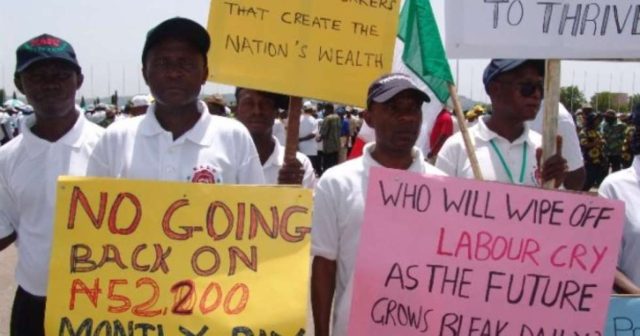National Issues
Minimum Wage, Maximum Trouble -By Koye-Ladele Mofehintoluwa

“Qu’ils mangent de la brioche(let them eat cake)“- Marie Antoinette
The dispute between employer and employee over wage has existed before even the term ‘wage’ was coined. One of these notable disputes held in France where workers complained that they could not afford bread and Marie Antoinette, a member of the royalty would claim(in translation) “if they can’t eat bread, let them eat cake”. Of course, there is no need to have much knowledge of the economy in France as at then to understand that cake would have been more costly than bread. The protesters and the Queen operated on two different types of reasoning which are both correct. For the Queen, should she wake up some morning and not desire to eat bread, she can call the bakers and tell them to make cake. For the protesters, however, cake is not an option but the cheaper bread has always been what the entirety of their existence is rooted upon. This mentality has reemerged in virtually all trade disputes.
On one side of the conflict table are ‘cake’ people who no longer understand the microeconomic because they have been soaked for too long in wealth either gotten legally or through corrupt means. The cake is an option for these ones if there is no bread and they simply would not understand how harsh the national conditions are or if they even do, they still believe the dustpoor can continue to manage little while they feed them with stories of their reward being in heaven or excuses of how the poor need to sacrifice for national advancement.

The ‘bread’ side of the conflict table has workers who have daily demands from their immediate families and are faced by an economy where the price of everything entirely has increased including the costs of individual transportation, the salary can no longer do what it used to and living on the same amount of work in the past has become harder. Thus, they reason, if my work has fed me in the past and the same amount of work no longer does there should be an increase in not the amount of work I do but the amount of pay that I used to be given.
The people on the ‘cake’ side of the table are those who would oppose wage increase yet have no fundamental issues with the high cost of funding elected public officers who despite the relative national poverty still get to take home very large sums of money. When the salary of public officers is compared internationally, Nigeria jumps up the list and can be prominently seen. When the wage of workers internationally is compared, Nigeria runs down the list to hide on the last lines as very great difference exists in international minimum wage comparisons to the negative while positive great difference exists when renumeration of elected public servants are compared.
According to a report by the Brookings Institution “at the end of May 2018, our trajectories suggest that Nigeria had about 87 million people in extreme poverty, compared with India’s 73 million. What is more, extreme poverty in Nigeria is growing by six people every minute, while poverty in India continues to fall”. Also, the International Monetary Fund (IMF), in its latest report on Nigeria, averred that despite the recovery of the nation’s economy from recession, more Nigerians were sliding into poverty.
The argument exists that the payment of minimum wage may lead to an inflation which is a rise in the general price level of commodities. It is argued that when it is increased, producers from the primary to the secondary levels would also increase the shelf price of their products by raising costs acting in the belief that the increase of the minimum wage(which affects all levels of civil servants positively including those not on the minimum wage) has also increased the purchasing power of the consumer. Thus, should this be the case, the money injected into getting the minimum wage increased would only court more trouble and severe inflation. This argument is quickly refuted by those who insist that the economy can only be better when people spend more and businesses can generate more profit and the government more revenue.
Both arguments quite overlook the important fact that a lot of the consumer goods in Nigeria are not locally produced. In event of an increase in minimum wage, the main profiteers would be foreign companies and the local economy will be deprived of more as people commit funds to the purchase of imported goods. This creates a major issue for concern as local production should receive a boost before minimum wage increase to ensure funds stay within the economy. However, who would explain to a Labour that hears frequent news of corruption that their minimum wage cannot be increased because the government needs to prioritise the development and encouragement of local production?
Among the myriad of issues that Nigeria faces is the trust that has been lost in government. As it stands presently, a lot of states cannot cope with the 18,000naira minimum wage structure. Nigerian Labour Congress just some months ago insisted on 65,000 naira but have now reviewed their call downwards by more than half to a 30,000 naira call. The country has suffered financial crises of late which include recession, inflation and a rise in unemployment vis-a-vis underemployment. Can Nigeria pay the minimum wage? There is a real absence of facts to use to answer this as the civil service maintained by the state and Federal governments are separate and a general answer cannot be found with the exception of states such as Lagos and Rivers where one can feel confident on their ability to pay an increased wage.
The people on the ‘bread’ side of the table are unlikely to listen to whatever the government has to say. The workers are incensed by continued news of corruption especially manifested in the brazen vote-buying episodes where politicians throw money out in the festival of getting the masses through inducements and leaving them afterwards to their poverty. Workers are also incensed by the anti-people policies of the government which includes a speculative increase of tertiary institution fees, an action the Academic Staff Union of Universities has already taken moves against by starting a nationwide strike.
In the face of this severe hardship, a call for the increment of the minimum wage is coming quite late and should have been made earlier. It is great surprise and wonder why Labour actions in past attempts have proven unpopular but this NLC Nov. 6 action looks promising this time around especially fueled by the rising political mood which has already made Nigerians pitch tents against or with the government of the day.
Labour actions in the past might have been unpopular due to the illusion held dear among Nigerian people that the Buhari regime was encountering difficulties while trying to create change. Presently, that mood has washed off to one of rage and impatience. The only thing left holding back a nationwide revolt is that the faith of the Nigerian labour and masses in the past NLC leaderships have proven betrayed. Thus, the reception is there for the strike action and nationwide sit-ins but the faith in the workers’ Union leaderships are not so strong.
Trying again to view the issue from the ‘cake’ side of the table, one finds that a minimum wage increase may be unrealistic as there is still a struggle to meet the old wage requirements. Again, there is the cost of oil in the international market as the major revenue generation means of Nigeria which would mean the government cannot plan to increase minimum wage anchoring it on the unpredictable international oil market where prices can crash the same way they have risen recently and is a market that is already being threatened of extinction by the combined forces of conservation/pollution-elimination and the force of developing newer technology. There is also the concern that the funds will make their way out of the economy should we consider that consumer goods are not locally produced and minimum wage increase would mean more of these items are purchased and the country is ultimately on the losing end.
Switching to the ‘bread’ side of the conflict table, one finds that workers need a living wage that copes with the current harsh economic realities. Workers are justified in their actions because the government cannot continue to spend so much for itself and elected public officials through excessive legal renumeration and surplus illegal sharings yet relinquish little to the masses and expect them to sacrifice even further while sending their children to schools that have become far costly than what the poor or average earner can afford. Should a person who is on the proposed 30,000naira wage desire to educate his child, he chooses between the dilapidated public institutions that are again becoming costly to the tune of the recent proposed fee of 500,000 or send them to private institutions where the costs are far above his earnings for a combined 5 years assuming he does not do anything else with his salary but to save it. There is a national hardship and the call for the minimum wage increase is not really selfish on the part of workers but is a desire for self-preservation in these hard times.
Despite the court order, NLC can choose to proceed with her strike and make it even more effective by ordering her component Unions such as ASUU(already on strike), NAT, NUPENG, NUT, NASU and other unions to declare their independent respective strikes. The court stops NLC and not these component sister units. The NLC also argues that the government has defied court orders severally and they claim they have received no court order. The argument the government too has defied court orders are only moral yet they are appealing.
To cast a final glance at the entire issue, one hopes that a solution is found somehow. The true finances of the government must be shown to the Nigerian Labour and they must understand why the new minimum wage cannot be funded should the government stand on this. The government must further take steps that will aid the trust of workers by cutting bogus salaries and jumbo take-home packages as this will ensure the workers are at rest and can trust their government. The workers, on the other hand, should try to be receptive in their talks and negotiations with the consideration of supreme national interest. But at the same time, they should not do what Nigerian street parlance describes as ‘sleeping on a bicycle’. That is, they should not be too willing to drop their agitation as it further reduces their credibility for future actions.
Koye-Ladele Mofehintoluwa is a member of the Centre for Human Rights. He is passionate about Labour Law and Human Rights. He is at present an undergraduate student of the Faculty of Law, Obafemi Awolowo University. He can be reached on koyetolu@gmail.com.



















